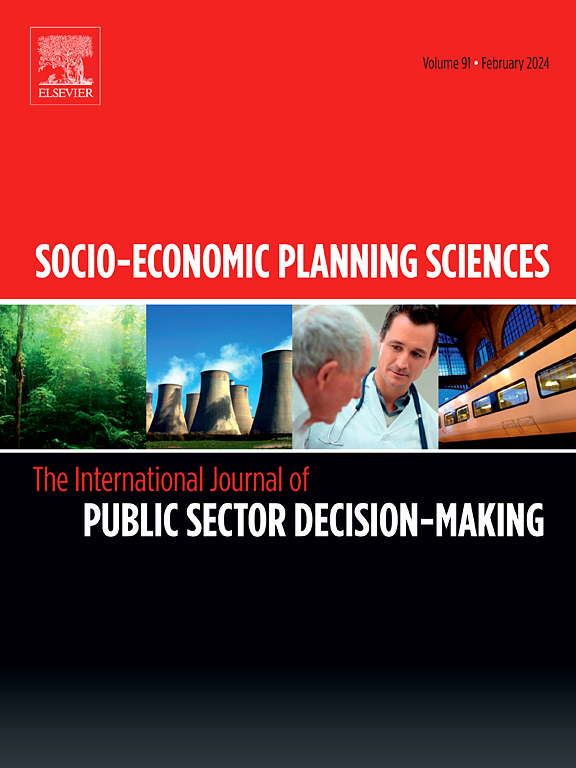为志愿者提供任务选择自主权和小组机会的优化框架
IF 6.2
2区 经济学
Q1 ECONOMICS
引用次数: 0
摘要
非营利组织(NPO)依赖志愿者来支持社区需求,但却很难对志愿者任务进行战略性分配,从而使志愿者满意并完成复杂的任务。创建志愿者小组并将其分配到非营利组织的任务中,可以为志愿者提供交流、合作和同伴学习的机会,从而帮助实现这些目标。然而,在战略上创建理想的任务分配是一项挑战,因为 (i) 一组志愿者可以以指数级的方式分配到不同的小组;(ii) 非营利组织对志愿者的个人偏好、可利用性和参与动机的数据往往有限且不确定。为了应对这些挑战,本研究引入了整数编程框架,为志愿者提供任务菜单供其选择,然后根据志愿者的意愿信息,创建理想的同质志愿者小组分配。在创建这些小组时,要确保小组集体满足任务的技能要求,并优先考虑技能和亲和力水平相似的志愿者小组。我们将所开发的方法应用到一个案例研究中,该案例基于一个与来自多个国家的远程志愿者合作制作在线教育内容的 NPO 合作伙伴。菜单创建方法可以改善 NPO 和志愿者的绩效指标,当 NPO 面对非常挑剔的志愿者时,该方法的改善效果最为明显。为志愿者提供更多的任务菜单也能提高理想的小组创建率。实施小组创建方法有助于在统计上显著提高理想小组创建率,但同时也会降低志愿者和 NPO 的收益。最后,实施最低理想小组规模并不会严重影响大多数关键绩效指标,而且对 NPO 来说也是有益的,因为它可以鼓励创建志愿者小组并将其分配到任务中。本文章由计算机程序翻译,如有差异,请以英文原文为准。
An optimization framework to provide volunteers with task selection autonomy and group opportunities
Nonprofit Organizations (NPOs) rely on volunteers to support community needs but struggle with making strategic volunteer-to-task assignments to enable volunteer satisfaction, and completion of complex tasks. Creation of volunteer groups and their assignment to NPO tasks can help achieve these goals by providing volunteers with opportunity for networking, collaboration, and peer learning. However, strategically creating ideal assignments is challenging because (i) there are exponentially many ways a set of volunteers can be assigned in groups; and (ii) NPOs tend to have limited and uncertain data concerning volunteers' personal preferences, availabilities, and motivations to participate. To address these challenges, this research contributes by introducing an integer programming framework to offer volunteers a menu of tasks to choose from and then based on volunteers' willingness information, creates ideal homogenous volunteer group assignments. These groups are created such that the group collectively meet a task's skill requirements and groups of volunteers of similar skill and affinity levels are prioritized. We apply the developed methodology to a case study based on a partner NPO that works with remote volunteers from multiple countries to produce online educational content. The menu creation method can improve NPO and volunteer-based performance metrics, where the most improvement is observed when a NPO is faced with very picky volunteers. Presenting volunteers with larger menus of tasks also leads to an improvement in ideal group creations. Implementing the group creation methodology helps obtain a statistically significant increase in ideal group creations but results in a tradeoff of decreased benefits to volunteers and the NPO. Finally, implementing a minimum desired group size does not severely impact most KPIs and would be beneficial for an NPO to implement as it encourages the creation and assignment of volunteer groups to tasks.
求助全文
通过发布文献求助,成功后即可免费获取论文全文。
去求助
来源期刊

Socio-economic Planning Sciences
OPERATIONS RESEARCH & MANAGEMENT SCIENCE-
CiteScore
9.40
自引率
13.10%
发文量
294
审稿时长
58 days
期刊介绍:
Studies directed toward the more effective utilization of existing resources, e.g. mathematical programming models of health care delivery systems with relevance to more effective program design; systems analysis of fire outbreaks and its relevance to the location of fire stations; statistical analysis of the efficiency of a developing country economy or industry.
Studies relating to the interaction of various segments of society and technology, e.g. the effects of government health policies on the utilization and design of hospital facilities; the relationship between housing density and the demands on public transportation or other service facilities: patterns and implications of urban development and air or water pollution.
Studies devoted to the anticipations of and response to future needs for social, health and other human services, e.g. the relationship between industrial growth and the development of educational resources in affected areas; investigation of future demands for material and child health resources in a developing country; design of effective recycling in an urban setting.
 求助内容:
求助内容: 应助结果提醒方式:
应助结果提醒方式:


